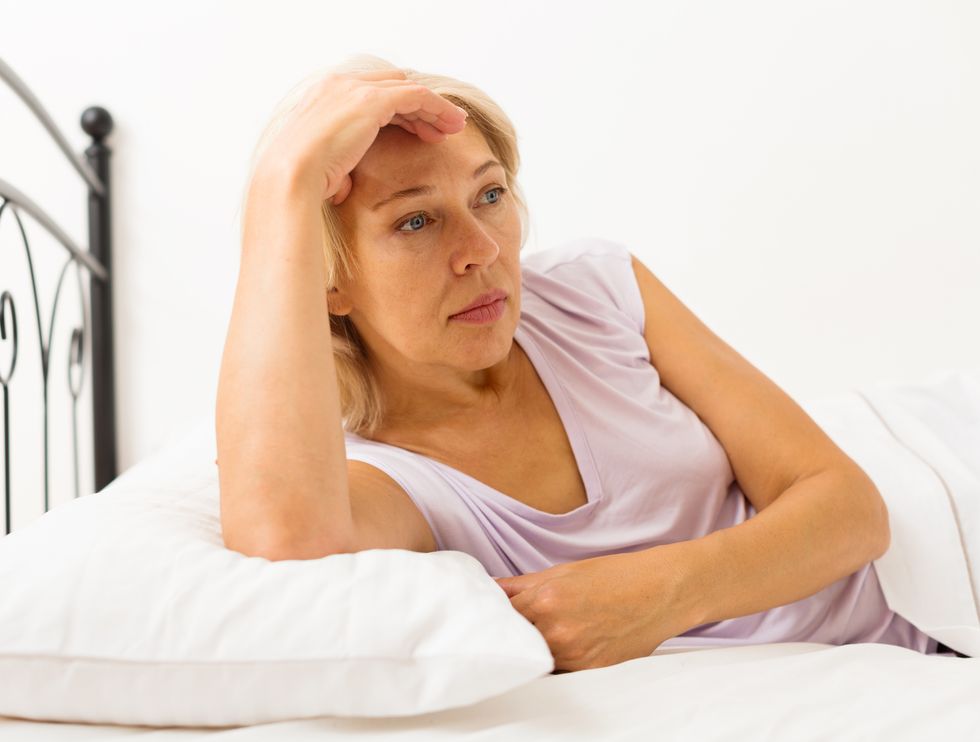During menopause, your body changes. Chief among women's complaints: vaginal dryness and other "down there" symptoms. Women agree this condition has a very big negative impact on their lives and self-esteem, using words and phrases like "old" and "less sexual" when describing how it makes them feel.
Why is this happening?
Renowned obstetrician/gynecologist Mary Jane Minkin, MD, a member of HealthyWomen's health advisory council and a champion of getting the word out to women, helps us out by explaining. She says this group of symptoms was previously known as vulvovaginal atrophy or VVA and is now genitourinary syndrome of menopause, also known as GSM or GUSM.
That's a mouthful. What exactly is it?
GSM encompasses a group of bothersome symptoms, like vaginal dryness, itching, urinary urgency and increased frequency, urinary tract infections and dyspareunia (painful intercourse) that affect more than half of women during and after menopause.
Why does this happen?
Blame hormones. Waning levels of estrogen and progesterone can affect the thin layer of moisture coating the vaginal walls. Suddenly, your vagina is more like a va-DRY-na, one of the most irritating (pun intended) aspects of menopause.
I know what a changing vagina feels like, but tell me if what I'm feeling is normal.
Itching, burning, stinging? Yep. All due to dryness, which can cause the vagina to become less elastic, or "stretchy," too. Sort of muscle weakness, if you will.
If that weren't enough, there's more possible fallout from lowered estrogen, like increased urinary tract infections, since estrogen helps to keep "bad" bacteria in check and allow the "good" bacteria to thrive.
And not to load it on, but you may also have problems with urination—like burning, urgency or incontinence.
Read What No One Tells You About Menopause.
And things like exercise and sex—don't even mention them. Ouch.
Yes, your less-lubricated vagina can feel tender and sore. It may even chafe or tear and bleed when you exercise or have sex. But, ironically, having more sex is one of the best things you can do for a dry vagina.
Why should I have more sex if it hurts? I don't get it.
Don't feel badly about not knowing this fact. The North American Menopause Society (NAMS) reports that, "Many sexually active women are unaware of the effect these changes (decreased estrogen) can have on the vagina in the absence of sexual activity."
Here's the thing. Sexual activity (or vaginal stimulation) promotes vaginal health by getting the blood flowing, which, in turn, keeps your vaginal muscles supple, toned and flexible. Kind of along the lines of that old saying, "If you don't use it, you lose it."
Also, your vagina can become shorter and narrower when you don't have sexual activity regularly after menopause, reports NAMS.
Learn more about When Sex Gives You More Pain Than Pleasure.
So, don't tell me I have to live with this. Is this my new normal?
Not at all. Vaginal issues won't go away on their own, but they can be treated in lots of ways. And you get double points for treating them: All of the meds that help the vagina also benefit your bladder. Win-win.
Like what?
An over-the-counter (OTC) vaginal moisturizer (like Replens) can keep a dry vagina more comfortable by drawing moisture into the vaginal wall. Minkin suggests using it two to three times a week.
Another OTC moisturizer available online, Revaree, contains hyaluronic acid, which can help moisturize a dry vagina.
Both of these are non-hormonal, safe and effective treatments.
Anything else?
Lots. An OTC lubricant can help ease painful sex by reducing friction you feel as a result of thin and dry vaginal tissue These go to work immediately, and are not absorbed into the skin.
A tip from Minkin: "I always encourage women to try a small amount (samples are great) of any lubricant—just to make sure it agrees with them (no sensitivities, etc.)—and then get a larger amount."
And what if I need something stronger?
Minkin is reassuring: "There are lots of prescription alternatives like vaginal estrogens (Imvexxy), with which there is minimal absorption of estrogen into the bloodstream; vaginal DHEA suppositories (Intrarosa), which is not associated with any significant absorption into the bloodstream; osphena (Ospemifene), an oral non-estrogen medication; and oral systemic hormone treatments. "But keep in mind that most experts do not push systemic therapy if you are not also experiencing hot flashes or wanting to protect against bone loss, and especially if you are far out from your last period," says Minkin.
Did someone say something about vibrators?
No, but we will. Minkin is a fan. "Vibrators are excellent, as they increase pelvic blood flow—and anything that encourages pelvic blood flow is good for moisture," she says.
What about the so-called "natural" remedies, like wild yam, soybeans, red clover and herbal medicines?
Whoa, Nelly. The research is scant. So says the U.S. National Library of Medicine and others.
What more can I do?
NAMS suggests cleansing the inner parts of your vulva with clean water—not soap—and using white unscented toilet paper. They also suggest ditching irritants like fabric softeners and anti-cling laundry products and any lotions and perfumed products, which could further irritate already fragile vaginal tissue.
Always consult your health care provider, who can help in your decision-making process and find the best treatment for you. "Never be afraid to discuss dryness and pain with your health care provider," says Minkin. "These are really common problems. And sometimes providers are embarrassed to bring up these options—but they shouldn't be. Suffering in silence is never a good idea!"
One last thought…
Surprisingly (or maybe not), a recent survey conducted by HealthyWomen found that 70 percent of the respondents were unaware of the culprit behind many vaginal issues. This makes sense. GSM is also reported to be way underdiagnosed.
So now you know. And all that knowledge adds up to power over your body.







